An Interview with Samantha Shannon, Author of "The Bone Season"
By Alastair Thompson
(with the assistance of Rosalea Barker)
22
year old UK Author Samantha Shannon is keeping
herself busy making history in publishing. Her first novel
The Bone Season was released in August
in 20 languages and has now been translated into eight more.
Three months after release 20th Century Fox acquired the
film rights and a film may follow shortly. And maybe, a
video game version too. On a flying visit to New Zealand
last month she sat down for an on camera
interview with Scoop Editor Alastair
Thompson in Auckland. Earlier they spoke by phone
when he was in Adelaide and an edited
transcript of that interview is also provided below.
( You can comment on this post at the Scoop Review of Books. )
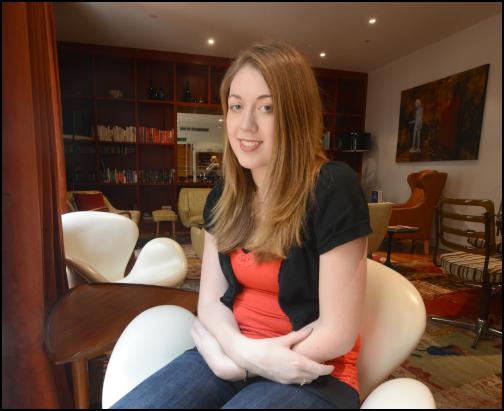
Samantha Shannon, Author of The Bone Season
In August this year Samantha Shannon's debut dystopic immersive fantasy novel The Bone Season was published by Bloomsbury Press- the publishers of the Harry Potter Series.
By November when I spoke to the young author the book had been translated into 28 languages and 20th Century Fox had signed on with Andy Serkis's Imaginarium Studios to make a movie version of the book.
Samantha - like J. K. Rowling - has planned out a seven novel series ( Bloomsbury signed a six-figure publishing deal for the first three books so far). It is unsurprising then that the initial press for the book has focused on comparisons with the publishing and film sensation.
And as the interviews below show the connections to the Harry Potter story run deep.
Samantha is part of the Harry Potter generation and grew up reading the books. As they were released Samantha would read them in a single sitting to avoid having the plots spoilt.
As a teenager she dreamed of walking in Rowling's footsteps. And now her dreams are rapidly coming true.
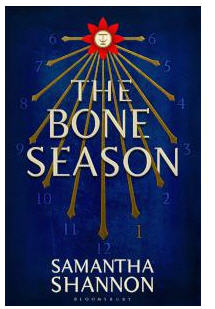 The Bone Season is set
in an alternate England where clairvoyance is considered a
scourge against society. A fascistic government called Scion
has made its business to hunt down clairvoyants and
imprison, kill and - for a small number - assign them to a
clairvoyant army based in the remains of Oxford which has
been taken over by aliens.
The Bone Season is set
in an alternate England where clairvoyance is considered a
scourge against society. A fascistic government called Scion
has made its business to hunt down clairvoyants and
imprison, kill and - for a small number - assign them to a
clairvoyant army based in the remains of Oxford which has
been taken over by aliens.
Written in the first person it is a fast paced page turner and very hard to put down.
And it is remarkable in other ways also. In particular it appears to be a forerunner for a new kind of publishing which seeks to replicate the Harry Potter phenomena. Only this time with a savvy young heroine as both author and central character.
Two years in the writing and editing Samantha Shannon blogged about the experience of preparing the novel for publication - building up a relationship with potential readers well before release of the actual book. Samantha is also tweeting about the experience of becoming a literary superstar at @say_shannon .
After reading The Bone Season on a flight back from a holiday in Bali - and finding that I could not put it down (much like Harry Potter) - I followed Samantha on Twitter and fairly shortly thereafter noticed she was on a tour in the Australia.
I contacted her by twitter and learned she replied whilst out for dinner with her Bloomsbury tour managers and said she was indeed coming to NZ ( I later noticed that Scoop had in fact already published a press release on her upcoming visit ).
Below is a transcript of the interview conducted subsequently by phone when she was in Adelaide. She had just visited a Zoo and met a Koala. I followed this up with the video interview that you can see below also.
In both interviews I was seeking to explore what it means to become a literary superstar at such an early age, as well as examine Samantha's relationship with her character Paige, who was the same age as Samantha when she started writing the series.
I wanted to know how close she was to this character and how much her book comes from the inspiration of Harry Potter on the one hand, and from her personal experience and views on life on the other.
Paige is a clairvoyant "dream walker" who can project her consciousness into the dreamscapes of others. Is there a parallel of a kind between this and what happens when a novelist creates a dreamscape - alternative reality - that we as readers immerse ourselves in?
"Sort of" Samantha replied on reflecting on the idea.
Samantha Shannon Interview #2
at
De-Brett's Hotel, High Street, Auckland Tuesday 19 November
2013
Samantha Shannon Interview #1
by
phone Wellington to Adelaide Friday 11 November 2013
Transcript by Rosalea Barker
Transcript by Rosalea Barker
(After introductions)
Scoop:
Your book
has also been compared with Hunger Games and with Northern
Lights. And it struck me that there’s almost elements of
Doctor Who and Twilight in there as well. There’s two
scenes that are slightly Twilight-y.
Shannon:
I didn’t intend to do that. I think that
Twilight is very heavily romance-centric, whereas mine is,
any romance is a subplot. I wanted to have it very
plot-driven.
Scoop:
Immersive fantasy
in the sense of the creation of alternative realties appears
to g a new form of popular escapism. And with it I think
J.K. Rowling was credited with reviving the interest in
reading for an enormous number of people. Was this the case
for you also?
Shannon:
Definitely. It
was such a hugely formative book for a whole generation.
Especially my generation. When I was younger, Harry Potter
was still coming out, so it definitely, probably helped form
a generation of fantasy
readers.
Scoop:
When did you first
read Harry Potter?
Shannon:
Gosh, how
old was I when I first read Harry Potter? I read it pretty
much when it first came out, so in 1997, I would have been
about seven. I read it pretty much from the beginning. My
grandmother heard about it and she got me a copy before it
was very well known.
Scoop:
And you
then kept up with it as it came
out?
Shannon:
Oh, I loved it! Yeah,
yeah, I totally loved
it.
Scoop:
That’s fascinating. I
thought that was likely to be the case, given how old you
are.
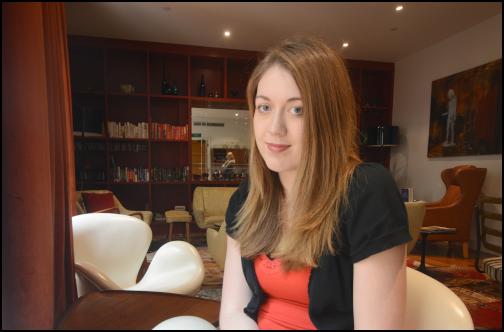
(changing subject)
Regarding the ‘on the merits of unnaturalness’ chart in the front of The Bone Season [ in the book this chart is attributed to one of the central characters - it breaks down and categorises a very large number of different kinds of clairvoyance gifts]—it’s sort of a breakdown of clairvoyance—is that based on some primary research that you did?
Shannon:
Yes. I wanted to
have a system of clairvoyance that drew from history and
various traditions like Spiritualism and the Native American
understanding of spirituality, and Roman augury and
soothsaying, cos I think it feels more kind of realistic if
it comes from a historical background. But also, I wanted to
put my own spin on each type as
well.
Scoop:
So that was original
research you did into comparative clairvoyance, pullingl
together lots of different streams of knowledge around
clairvoyance?
Shannon:
Yeah, as far
as I know, it hasn’t been categorised in that way before.
The idea of the seven different groups is mine. I took
certain things within that—like, obviously, medium comes
from Spiritualism and it was a Victorian obsession. A lot of
the soothsayer and augur types are based on actual types in
the Roman era. But the actual classification system is
mine.
Scoop:
That’s quite
remarkable, and that probably comes back to that idea of
immersive fantasy in terms of you creating a vision of a
reality for your characters to inhabit. My first thought
when I was reading The Bone Season was that wanted to
hear more about this amazing alternative
reality.
Shannon:
I’m glad to hear
that.
Scoop:
How long have you been
studying, and interested in,
clairvoyance?
Shannon:
It was never
particularly something of interest to me until I got the
idea for The Bone Season, which was in July 2011. I
was working in an area in London—Seven Dials, where the
book is set—and there are quite a lot of stores in the
area that sold Tarot cards and crystal balls and did psychic
readings and that kind of thing. It just kind of occurred to
me that I hadn’t read or heard of a book that had a
detailed society of clairvoyant people, and I just got
really excited by the idea. That’s when I started
researching it.
Scoop:
You must have
read very widely in order to identify so many different
types of soothsayer and
others.
Shannon:
Yeah, I did quite a
lot of research. I wanted it to feel as if had come from
research. I wanted it to feel detailed and kind of realistic
despite the fantasy element.
Scoop:
I
know some people who claim to be "sighted" in the
clairvoyant sense, even members of my family. They say they
see colours near people. They tell various people this and
they don’t necessarily believe them when they do so. Did
you also talk to clairvoyants as well, as part of your
research?
Shannon:
I actually
didn’t, because I wanted it to be something I did just by
myself. I haven’t really spoken to any people who are
clairvoyant or people who can see auras. Although, I have
since heard from people who have those kinds of gifts. But I
just wanted to work on it in private and make it my project.
Just purely from historical
research.
Scoop:
What about since
then? What about family clairvoyance?
Shannon:
Family clairvoyance? No,
actually, not that I know of, anyway. It’s very much just
something that I became interested in after I got the
idea.

Scoop:
You
dedicate the book to dreamers, and you sign it off in the
acknowledgments saying, "Thanks for taking a chance on a
dreamer". So you see yourself as a
dreamer?
Shannon:
Oh, yes. Very much.
I’ve always been an imaginist, to use Jane Austen’s
word, someone who just loved dreaming up stories. I wanted
to dedicate the book to people who love fantasy, and to
people who just have a dream. It was just something I wanted
to do. As a young child, I always dreamed of being a writer.
Now I’ve kind of got that dream, I wanted to dedicate a
book to people who are
dreamers.
Scoop:
This is probably a
step too far, but it’s what always happens when people
love books—they look for deeper meaning. I wonder if
there’s a sense of you also being a dreamwalker like your
character Paige, metaphorically creating a dreamscape for
your readers.
Shannon:
I suppose so,
yeah. I spoke to someone who said that writing is a kind of
clairvoyance, because writers want to essentially read minds
and find stories in people. I wasn’t thinking about that
metaphorically, exactly, when I wrote it. But you can put
your own meaning on it, I
guess.
Scoop:
Also the character is
your age, too, and it’s set in Seven
Dials.
Shannon:
Yes.
Scoop:
When
we are young and we… well my own experience of reading has
always involved a strong sense of indentification with
characters in books, and I think that’s part of what makes
literature so wonderful as a form of escapism.
Shannon:
Absolutely.
Scoop:
Do
you identify with Paige?
Shannon:
I
guess it depends what you mean by “identify”. Obviously,
she’s had very different experiences that have shaped her
than I’ve had. I kind of live vicariously through her I
guess. I understand her probably - obviously - more than
she understands herself. I do really love her. I’ve never
really connected with a narrator like I have with Paige. As
a kid or as a teenager, I generally wrote in third person
and Paige was the first person I’ve really, properly,
tried to write from someone else’s perspective, from
inside someone else’s head. So yes I do feel very closely
connected with her.
Scoop:
At times in
the book Paige gets a little bit annoying. She’s 19, and
she’s a bit angry and she does things which get people
hurt on several occasions, as
well.
Shannon:
Yes, yes she does. I
understand her and I understand her foibles, and I think
they make her more human. It’s so important to me not to
write a character who’s just perfect and does everything
right all the time, because no one’s going to identify
with a character like that. You need to have a character
that makes mistakes, and preferably learns from
them.
Scoop:
So on one level is the
book an introduction to Paige and her
world?
Shannon:
Yes, I agree. I think
any first book in a series lays quite a lot of foundation,
both in terms of the world and the character.
Scoop:
Which brings me to another
question which everybody who has read The Bone
Season will be asking as soon as they finish it:
When do we get the next
book?
Shannon:
I’m working on it
right now, and I very much hope it will be out next year.
I’m not saying that for certain, but I’m working as hard
as I can because I would like to get it out next year. I
know how frustrating it can be to wait for the second book
in a series or any book in a series. I don’t want to leave
people waiting for too
long.
Scoop:
It’s a fairly delicious
anticipation, too I think. And I wonder if that was possibly
what some of the success of the Harry Potter phenomena was
all about.
Shannon:
Totally, yeah. It
was kind of an event when the next Harry Potter book came
out. A cultural event that everyone waited for every year on
the calendar.
Scoop:
Yes, and then
read it for 24 hours,
non-stop.
Shannon:
Yes, exactly. Just
in case someone spoiled it.
Scoop:
Is
that what you did with the last Harry Potter book,
yourself?
Shannon:
I did it with every
Harry Potter book, pretty much. I used to read them in a day
because I was so terrified of someone spoiling
them.
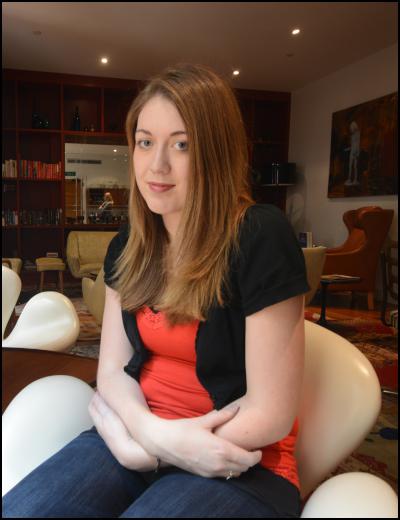
Scoop:
So
is it in post-production now, the second
book?
Shannon:
Basically, the second
book, well I started it while we were still - my editor and
I - were still working on The Bone Season. So it had
quite a lot of inconsistencies because I changed a few
things in The Bone Season. I wrote 50,000 words and I
then deleted the entire thing because I thought it just
wasn’t good enough. It just wasn’t a good book, so I
deleted the whole thing, and I’m now 63,000 words back
into it.
Scoop:
Bloomsbury signed on
for three books so far, is that
correct?
Shannon:
Yes, three. We’re
very committed to doing all seven, but we thought it
might… especially as I was only 20 when I signed the deal,
it was quite a big thing for a young writer to have a
seven-book legal contract. I’m very committed to doing all
seven, but we just agreed that three was good for
now.
Scoop:
So you have a sweeping arc
for the story then? An idea of the narrative path. This was
something that JK Rowling aways said that she had, too. For
several years she said she knew how it was going to
end.
Shannon:
Yeah, I think it is
definitely helpful to have some direction, some sense of
direction. I don’t know how much JK Rowling plotted her
chapters in detail. I don’t really do each chapter in
detail. I have the key points of each book. I think if you
rigidly plan it too much, it just takes the fun and the
spontaneity out of it.
Scoop:
As a
book launch, The Bone Season also unprecedented and
it could be said you are making publishing history here.
Twenty languages simultaneous release.
Shannon:
Twenty-eight,
now.
Scoop:
Twenty-eight
languages?
Shannon:
Yeah.
Scoop:
Do
you know how many copies have
sold?
Shannon:
I have no idea, I’m
afraid. I haven’t got any kind of sales figures on
it.
Scoop:
It’s still relatively
recent since it was launched. That seems truly
remarkable.
Shannon:
It came out on
the 20th of August, so it’s been a few months
now.
Scoop:
A relatively few—three,
four.
Shannon:
In the wider scheme of
things, yes, it is a small amount of
time.
Scoop:
One of the things I’ve
also noticed is that your blog and Twitter presence pre-date
release. That is also pretty unusual for a new
author.
Shannon:
I started my blog
when I got the book deal because I thought I was in quite a
unique position as a writer who… so the blog is called
A Book from the Beginning—I wanted to chart it
right from the beginning to publication and beyond, and to
explain to people who maybe want to write how each stage
works. People could ask questions, and it was a really great
experience writing it and I am going to continue writing it
in the future, just perhaps slightly less
frequently.
Scoop:
The book itself
reads a little bit like a screenplay sometimes. There’s a
lot of physical scrapping and violence and chase scenes and
dramatic settings. Running across rooftops. Great
opportunities for really good computer graphics
effects.
Shannon:
Yes.
Scoop:
Was
the idea of a film also in mind when you wrote
it?
Shannon:
No, not particularly when
I wrote it. I wasn’t even convinced it was going to be
published. I just wanted to write this story. I did want it
to be published but I kind of wondered initially if The
Bone Season was just too strange to be published. It
didn’t really fit well into one genre box, so I certainly
wasn’t thinking about film adaptation when I wrote it.
Although, the book was quite inspired by visual things. I
get migraine headaches, and I see sort of like a coloured
aura when I get a migraine, so that’s where I got the idea
for aura from. It’s quite a visually inspired book, but I
wasn’t specifically thinking about a film when I wrote it,
no.
Scoop:
The physical violence, too,
is quite striking. A lot of punching and hitting. Paige gets
beaten up quite a lot.
Shannon:
She
does, yeah.
Scoop:
And is very
physically active. Which I think is why the book is compared
so much with Hunger Games.
Shannon:
Yes, I imagine so. It is
dystopia, at the end of the day, and so is Hunger
Games, and in dystopia it’s a harsh violent world, and
unfortunately for Paige, she’s exposed to that quite
regularly.
Scoop:
Can you tell me a
little bit about The Hunger Games. Did you read that
series, too?
Shannon:
No, I read it
shortly after I started writing The Bone Season
actually, and I didn’t read Catching Fire and
Mocking Day for quite while. I was quite late to the
Hunger Games
party.
Scoop:
I’m interested in
these new, female, young characters who are very good at
fighting. I wonder if this may be a bit Millennial—it’s
not a genre, but it’s something slightly new in terms of
literature, I think.
Shannon:
Yeah, I
think there’s definitely been a trend to having sort of
active female
characters.
Scoop:
Another thought I
had reading the book is that it would also be very well
suited to be made into a video game.
Shannon:
Yeah, I think it would be
quite cool if that
happened.
Scoop:
Your tie-up with Andy
Serkis's Imaginarium Studios interested me as there is a
connection through that to Wellington - because of Gollum
and the Lord of the Rings
Connection.
Shannon:
The Andy Serkis
production company has the film rights, so he’s very into
the CGI and the motion capture and
whatnot.
Scoop:
How far away will the
first movie be, do you
think?
Shannon:
It’s very difficult
to put a time on film because there’s so many different
things that can happen on the route to production. At the
moment, they’re looking for a screenwriter. It was a huge
deal for us to sell the rights… Originally, I sold it to
the Imaginarium Studios and it was then very recently
acquired by Twentieth Century Fox , so it was very exciting
that we now have a studio backing it and we’ve got all
four producers in place. Now we’re in the process of
actually getting a script written.
Scoop:
That is so cool. How recently
did 20th Century Fox join?
Shannon:
A
few weeks ago. I’m pretty sure it was in October that Fox
acquired it.
Scoop:
How do you feel
about working for Rupert
Murdoch?
Shannon:
[laughs] I didn’t
actually realize that it was a Murdoch
company!
Scoop:
Are you a gamer,
yourself, at all?
Shannon:
I was
pretty much raised on Tomb Raider and games like that. I
haven’t played very much recently, I have to admit, just
because I write now, generally. But, yeah, I am quite a
gamer at heart.
Scoop:
So you did play
video games? Tomb Raider was sort of towards the beginning
of the console era, I
think.
Shannon:
Yeah, I used to play
it on a joystick. It was the very early PC
days.
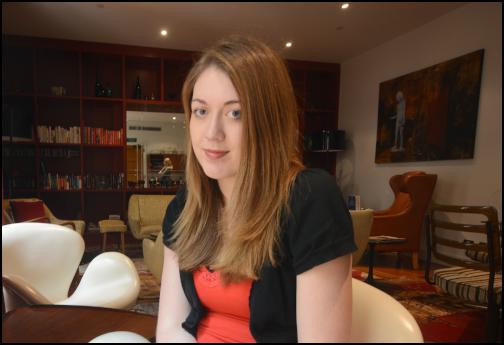
Scoop:
What
was your unpublished book like? It mentions in your
biography various times that you wrote another book before
this.
Shannon:
Yes, Aurora. It
was my bizarre, sci-fi romance epic—whatever that means,
but that’s what I called
it.
Scoop:
Is it going to see the
light of day?
Shannon:
No. Never! It
wasn’t very good. It was very clichéd. I started
developing the very early idea for the dreamscape in
Aurora and I took that into The Bone Season. So
the best about that book, I did use, but it just wasn’t a
brilliant book.
Scoop:
Final question
here. We always like to ask visitors to New Zealand what
they think of New Zealand. You’re not here yet, though.
Have you ever been here
before?
Shannon:
I haven’t been
there before, no.
Scoop:
What are you
expecting?
Shannon:
I’m expecting
sweeping Lord of the Rings vistas.
Scoop:
Right. But unfortunately, I
think, you’re only going to Auckland for a couple of
days.
Shannon:
Yeah, I know. I’d
actually love to stay longer, it sounds incredible. I would
love to explore New Zealand. It just looks
incredible.
Scoop:
I presume this
visit downunder is part of long international
tour
Shannon:
I’m not really on an
international tour. I’m doing different countries quite
sporadically. I did a European stint where I went to
Stockholm and Norway and Bucharest. Then I just did here,
and then I’m going to India in January. So it’s not
really one long tour; it’s sort of like several small
tours.
Scoop:
Cool. So The Bone
Season is a remarkable book, and I’m looking forward
to meeting you when you get here. And I hope you have a
lovely time for the rest of your days in Australia, and a
good flight over here.
Shannon:
Thank
you so much. It was great to talk to
you.
( You can comment on this post at the Scoop Review of Books. )
ENDS



 Gordon Campbell: On Why Leakers Are Essential To The Public Good
Gordon Campbell: On Why Leakers Are Essential To The Public Good Ramzy Baroud: Global Backlash - How The World Could Shift Israel's Gaza Strategy
Ramzy Baroud: Global Backlash - How The World Could Shift Israel's Gaza Strategy DC Harding: In The Spirit Of Natural Justice
DC Harding: In The Spirit Of Natural Justice Martin LeFevre - Meditations: Animal Encounters During Meditative States
Martin LeFevre - Meditations: Animal Encounters During Meditative States Ian Powell: Gisborne Hospital Senior Doctors Strike Highlights Important Health System Issues
Ian Powell: Gisborne Hospital Senior Doctors Strike Highlights Important Health System Issues Keith Rankin: Who, Neither Politician Nor Monarch, Executed 100,000 Civilians In A Single Night?
Keith Rankin: Who, Neither Politician Nor Monarch, Executed 100,000 Civilians In A Single Night?